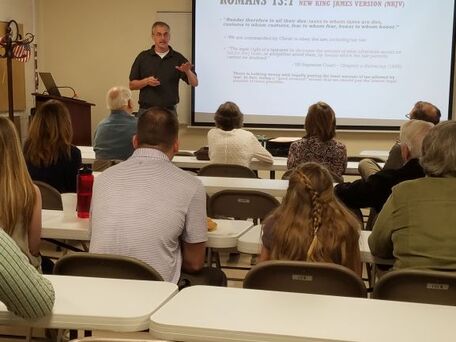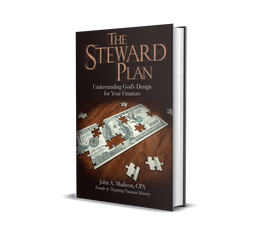Q&A with author and financial expert John Madison

Q: What does it mean to be a good steward?
A: The concept of stewardship goes beyond strictly Biblical application, although it is often thought of as a “Christian” term. Quite simply, a steward is one that manages another’s property. Importantly, they don’t actually own it. God owns it all and we are just stewards, or managers, of His property. A good steward would be one who manages assets under their control as specified by the owner of the property. From a personal finance perspective, this means that we should look to Scripture to show us how we are to manage the wealth under our control, whether much or little. This is actually quite liberating for a Christian! Instead of trying to figure out what to do financially, we can look to Scripture for wisdom to follow. I wrote The Steward Plan to be a resource to help turn God’s guidance into actionable steps in today’s world.
Q: One of the first things you address in your book is the question “Should a Christian be financially successful?” What is the answer to that?
A: While the reality is that every Christian will not be financially “successful” as the world defines it, any Christian who God has blessed with wealth should never be ashamed of that blessing. Nor should a Christian look negatively toward other believers who may have attained a higher level of wealth. The issue should be how well each of us manages whatever resources God has provided to us, not whether we have more or less than someone else. There is nothing wrong with wealth built honestly and managed using God’s guidance. We run into problems when we try to gain it sinfully or use it for our own selfish purposes.
Q: What is the financial question you get most often?
A: Many people seem to struggle with deciding who to trust as they consider their financial resources and stewardship responsibility. We all read stories about financial “advisors” abusing their client’s trust by looking out for themselves instead of the client. “Are they recommending an investment or insurance product that’s right for me, or because it pays a fat commission?” For churches, it’s much the same. Many church leaders are probably unqualified to provide in-depth financial teaching but are unsure who they can trust to lead a discussion for their congregation. When I go teach a workshop at a church or ministry, I commit to being completely independent with my advice, and instead, focus only on education. I go for free, take no commissions on any products, and act as a neutral, knowledgeable voice to help teach them to make financial decisions consistent with Scripture.
Q: As the economy becomes more global every year, are there some tried-and-true tips you have for people on how to invest?
A: None of us can control whether stock prices or interest rates rise or fall, but that doesn’t mean we are powerless. There are a few things we can influence as individual investors: costs, taxes, and risk. Costs are minimized by using inexpensive, well-diversified index funds. Taxes are reduced, for example, by considering asset location (which investments are in which types of accounts) or using an efficient distribution strategy. Finally, investment risk is managed by building a proper asset allocation based on your age, financial situation, need and risk tolerance. All of these topics are covered in The Steward Plan.
A: The concept of stewardship goes beyond strictly Biblical application, although it is often thought of as a “Christian” term. Quite simply, a steward is one that manages another’s property. Importantly, they don’t actually own it. God owns it all and we are just stewards, or managers, of His property. A good steward would be one who manages assets under their control as specified by the owner of the property. From a personal finance perspective, this means that we should look to Scripture to show us how we are to manage the wealth under our control, whether much or little. This is actually quite liberating for a Christian! Instead of trying to figure out what to do financially, we can look to Scripture for wisdom to follow. I wrote The Steward Plan to be a resource to help turn God’s guidance into actionable steps in today’s world.
Q: One of the first things you address in your book is the question “Should a Christian be financially successful?” What is the answer to that?
A: While the reality is that every Christian will not be financially “successful” as the world defines it, any Christian who God has blessed with wealth should never be ashamed of that blessing. Nor should a Christian look negatively toward other believers who may have attained a higher level of wealth. The issue should be how well each of us manages whatever resources God has provided to us, not whether we have more or less than someone else. There is nothing wrong with wealth built honestly and managed using God’s guidance. We run into problems when we try to gain it sinfully or use it for our own selfish purposes.
Q: What is the financial question you get most often?
A: Many people seem to struggle with deciding who to trust as they consider their financial resources and stewardship responsibility. We all read stories about financial “advisors” abusing their client’s trust by looking out for themselves instead of the client. “Are they recommending an investment or insurance product that’s right for me, or because it pays a fat commission?” For churches, it’s much the same. Many church leaders are probably unqualified to provide in-depth financial teaching but are unsure who they can trust to lead a discussion for their congregation. When I go teach a workshop at a church or ministry, I commit to being completely independent with my advice, and instead, focus only on education. I go for free, take no commissions on any products, and act as a neutral, knowledgeable voice to help teach them to make financial decisions consistent with Scripture.
Q: As the economy becomes more global every year, are there some tried-and-true tips you have for people on how to invest?
A: None of us can control whether stock prices or interest rates rise or fall, but that doesn’t mean we are powerless. There are a few things we can influence as individual investors: costs, taxes, and risk. Costs are minimized by using inexpensive, well-diversified index funds. Taxes are reduced, for example, by considering asset location (which investments are in which types of accounts) or using an efficient distribution strategy. Finally, investment risk is managed by building a proper asset allocation based on your age, financial situation, need and risk tolerance. All of these topics are covered in The Steward Plan.

Q: You also discuss tithing at length in the book. How important is tithing in a Christian’s life?
A: Tithing is a critical step in Biblical stewardship. From a practical perspective, your local church is funded through tithing. As important as this is for the church, the giver’s benefits are even greater. Through our tithes, we return a portion of our income both in obedience to Scriptural guidance and in recognition that all we have is His anyway. Done cheerfully, it moves our thoughts from self-focused to God-focused. In Malachi 3, God said regarding the tithe, “Test me in this,” says the LORD Almighty, “and see if I will not throw open the floodgates of heaven and pour out so much blessing that there will not be room enough to store it.” These blessings may or may not be financial, but He promises to bless us for faithful tithing. Interestingly, this is the only place in the Bible that God asks us to test Him. In my counseling ministry, I have yet to meet anyone who regretted tithing or feels they would have been better off financially or spiritually if they hadn’t done so. We should take God up on His challenge!
Q: You and Dave Ramsey agree on a lot of points. Where do you diverge from his teaching on money?
A: Dave Ramsey has helped millions of families through Financial Peace University and I’ve led many FPU classes myself. There is a lot of overlap between our ministries as we refer to the same Bible (and common sense!) for personal financial advice. My approach is typically more case-specific. Personal finance is much more about the personal than the finance, so no one set of rules fits every family. My goal is to teach what the Bible says about our finances and then how to implement it. The exact order and amounts should be prayerfully determined after gaining an understanding of the principles. Dave and I also disagree about how to invest for retirement. I greatly respect the program he has put together, but I feel that successful long-term investing should be more individualized. No one asset allocation is appropriate for every investor. Many of our investing principles are the same (such as using mutual funds), even if the implementation recommendations are different.
Q: You go into a lot of specifics when it comes to handling money in this book. Are there a couple of specific strategies you can offer that everyone should be doing?
A: First, actually pay attention to your finances! We are instructed to “know the condition of [our] flocks” (Proverbs 27:23, NIV), which we can’t do if we’re not proactively managing them. This isn’t a suggestion; it’s a directive. Stewards actively manage, not sit passively and hope something good happens. Second, everyone needs a spending plan regardless of their income. I try not to call it a “budget” because so many people view that word negatively. However, in Luke 14:28 (NIV), Jesus said, “Suppose one of you wants to build a tower. Won’t you first sit down and estimate the cost to see if you have enough money to complete it?” He’s talking about a spending plan created before you spend the money. We can’t expect to maximize the value of the wealth He’s blessed us with by managing it without a plan. Finally, work toward freedom from debt. While being in debt is not a sin, there are no verses in the Bible praising it either. In fact, the borrower is called a slave to the lender (Proverbs 22:7). We are set free through Christ. Let’s not return chains to ourselves by being in debt. For most families, their greatest long-term wealth-building tool is their income. Whatever portion is committed to debt payments (even at 0% interest rates) cannot be used to honor God, help others and build wealth.
A: Tithing is a critical step in Biblical stewardship. From a practical perspective, your local church is funded through tithing. As important as this is for the church, the giver’s benefits are even greater. Through our tithes, we return a portion of our income both in obedience to Scriptural guidance and in recognition that all we have is His anyway. Done cheerfully, it moves our thoughts from self-focused to God-focused. In Malachi 3, God said regarding the tithe, “Test me in this,” says the LORD Almighty, “and see if I will not throw open the floodgates of heaven and pour out so much blessing that there will not be room enough to store it.” These blessings may or may not be financial, but He promises to bless us for faithful tithing. Interestingly, this is the only place in the Bible that God asks us to test Him. In my counseling ministry, I have yet to meet anyone who regretted tithing or feels they would have been better off financially or spiritually if they hadn’t done so. We should take God up on His challenge!
Q: You and Dave Ramsey agree on a lot of points. Where do you diverge from his teaching on money?
A: Dave Ramsey has helped millions of families through Financial Peace University and I’ve led many FPU classes myself. There is a lot of overlap between our ministries as we refer to the same Bible (and common sense!) for personal financial advice. My approach is typically more case-specific. Personal finance is much more about the personal than the finance, so no one set of rules fits every family. My goal is to teach what the Bible says about our finances and then how to implement it. The exact order and amounts should be prayerfully determined after gaining an understanding of the principles. Dave and I also disagree about how to invest for retirement. I greatly respect the program he has put together, but I feel that successful long-term investing should be more individualized. No one asset allocation is appropriate for every investor. Many of our investing principles are the same (such as using mutual funds), even if the implementation recommendations are different.
Q: You go into a lot of specifics when it comes to handling money in this book. Are there a couple of specific strategies you can offer that everyone should be doing?
A: First, actually pay attention to your finances! We are instructed to “know the condition of [our] flocks” (Proverbs 27:23, NIV), which we can’t do if we’re not proactively managing them. This isn’t a suggestion; it’s a directive. Stewards actively manage, not sit passively and hope something good happens. Second, everyone needs a spending plan regardless of their income. I try not to call it a “budget” because so many people view that word negatively. However, in Luke 14:28 (NIV), Jesus said, “Suppose one of you wants to build a tower. Won’t you first sit down and estimate the cost to see if you have enough money to complete it?” He’s talking about a spending plan created before you spend the money. We can’t expect to maximize the value of the wealth He’s blessed us with by managing it without a plan. Finally, work toward freedom from debt. While being in debt is not a sin, there are no verses in the Bible praising it either. In fact, the borrower is called a slave to the lender (Proverbs 22:7). We are set free through Christ. Let’s not return chains to ourselves by being in debt. For most families, their greatest long-term wealth-building tool is their income. Whatever portion is committed to debt payments (even at 0% interest rates) cannot be used to honor God, help others and build wealth.
About the author:

John Madison is a Certified Public Accountant and the founder of Dayspring Financial Ministry. He earned a Master’s Degree in Personal Financial Planning (MSPFP), as well as the Master Planner Advanced Studies (MPAS), CRPC (Chartered Retirement Planning Counselor) and AWMA (Accredited Wealth Management Advisor) designations. He has been featured in the New York Post, Forbes, Chicago Tribune, U.S. News and World Report, Bankrate.com, CNBC.com, among many other media outlets. For more information, visit http://www.dayspringfm.com.
Endorsements:
“A masterpiece that weaves together wisdom combined with practical guidance, The Steward Plan is a handbook that provides a money map pointing in the direction of financial freedom God’s way.” — Mark Lloydbottom, FCA, Education and Training Director, Your Money Counts
“The Steward Plan does a great job of bringing the stewardship message to life. If you believe, as we do, that God owns it all you will be well served by following The Steward Plan.” — Mary Jo Lyons, CFP, CKA, Wealth Advisor, CIS Wealth Management Group
“John does an excellent job of sharing biblical wisdom regarding money and stewardship. As a natural teacher, his ability to take complicated issues and distill them into easy-to-understand application ideas is what makes The Steward Plan so valuable.” — Jason Parker, RICP, Author of Sound Retirement Planning
“The Steward Plan is a clear pathway to following in planning your finances God’s way. From an experienced financial expert, the book gives practical advice to reach your financial goals, while being a steward with whom God can be pleased!” — Peter J. Briscoe, Chairman, Compass—Finance God’s Way
“The Steward Plan does a great job of bringing the stewardship message to life. If you believe, as we do, that God owns it all you will be well served by following The Steward Plan.” — Mary Jo Lyons, CFP, CKA, Wealth Advisor, CIS Wealth Management Group
“John does an excellent job of sharing biblical wisdom regarding money and stewardship. As a natural teacher, his ability to take complicated issues and distill them into easy-to-understand application ideas is what makes The Steward Plan so valuable.” — Jason Parker, RICP, Author of Sound Retirement Planning
“The Steward Plan is a clear pathway to following in planning your finances God’s way. From an experienced financial expert, the book gives practical advice to reach your financial goals, while being a steward with whom God can be pleased!” — Peter J. Briscoe, Chairman, Compass—Finance God’s Way